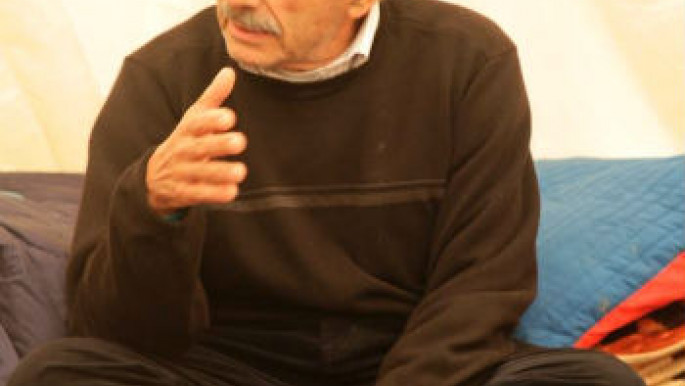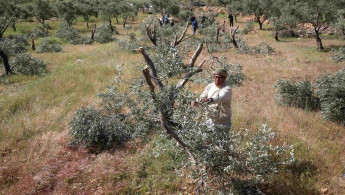The roots of resilience in Palestinian culture
June 5 this year will mark the 50th anniversary of the Israeli occupation of the West Bank and Gaza Strip.
Palestinians have endured decades of military occupation, colonisation and institutionalised oppression in what is the longest-running conflict in recent history - yet the creativity, courage and resilience of the community in the face of this onslaught has inspired generations of activists around the world.
The roots of this resilience lie deep within both language and culture, according to Dr Munir Fasheh, a professor of mathematics and education, and a leading visionary on rooted community organising in the Palestinian West Bank.
Macaulayism in Palestinian education
"I was deceived for much of my life," says Munir, seated cross-legged on a mattress on the floor of a tent, addressing a cohort of permaculture students in a session on "rootedness" during a recent course at Mashjar Juthour, an eco-park close to Ramallah.
"I believed that achievement and fulfilment came through attaining qualifications from institutions. I got my Masters in mathematics, and my doctorate in Education - from Harvard - and became a teacher of maths at Birzeit University, and believed I was a very clever and successful young man.
"My wake-up call came from my illiterate mother, who was a tailor - a maker of women's clothes. I realised that with all my learning and qualifications, her maths was more complex than mine, dealing as it did with all the dimensions of a woman's body, and that I could neither model it nor understand it. This caused me to rethink what I thought I knew about education, institutions and power."
 |
|
| Dr Munir Fasheh reflects on educational cultural concepts [Alice Gray] |
He continued his reflection: "I realised that much of what we are taught by educational institutions is based on authority, on competition and on concepts of winning and control - either in debate or simply by being 'better' than others.
"I also realised that these cultural concepts were Western imports, imposed on us by the British as a method of controlling us, and that they had nothing to do with our indigenous culture. They were designed to make me proud to be a slave."
This control strategy has its roots in the British colonisation of India according to Fasheh, where Macaulay, in his position as Secretary to the Board of Control from 1832 to 1833, formulated a strategy of consciously undermining indigenous culture through so-called "education" in a divide-and-rule scenario where hierarchy and notions of superiority were imposed on the native population.
In his Minute on Indian Education, published in 1835, he wrote:
"We must at present do our best to form a class who may be interpreters between us and the millions whom we govern - a class of persons Indian in blood and colour, but English in tastes, in opinions, in morals and in intellect."
He goes on in the same text to denigrate the value of Oriental culture and learning, claiming:
"I have never found one [Oriental scholar] who could deny that a single shelf of a good European library was worth the whole native literature of India and Arabia."
Thus Macaulay's education policies were based not only on the will to control the native population but also on the assumption of the innate superiority of Western modes of thought, and hence the moral justness of colonialism. This "toxic" ideology, according to Fasheh, is embedded within the formal education system imported to Palestine under the aegis of the British Mandate, whereas its antidote is to be found within the cultural structures that are innate to the Arabian people.
Mujawarrah and community resilience
"Mujaawarrah is an Arabic word that has no direct translation in English," says Fasheh. "An approximation of its meaning could be 'neighbouring', but that is only an approximation and does not really capture the meaning."
He went on to clarify: "At age seven, I became a refugee along with all the other members of my family. Eight of us lived in one room in Ramallah. Conditions were extremely hard, yet I remember it as a time filled with love and nurturing, both between members of my family and with our neighbours. That is the essence of Mujaawarrah: a group who have decided to be together and support each other without hierarchy or competition, using the resources that are available to them."
Munir Fasheh quit his job at Birzeit University in 1989 and started the Tamer Institute for Community Education, applying his evolving concepts of Mujaawarrah to educational models where young people would form non-hierarchical learning groups to explore concepts through reading and discussion. He went on to become a member of Harvard University's Center for Middle Eastern Studies, applying similar educational models to create the Arab Education Forum.
 |
Muthenna is a very beautiful concept that could broadly be translated to mean 'without your existence my existence is meaningless' |  |
"Mujaawarrah is a form of learning that operates in freedom and not fear, and functions in conjunction with other key concepts from within the Arabic language," explains Munir. "Perhaps two of the most important are Muthenna and Ijtihaad."
"Muthenna is a very beautiful concept that could broadly be translated to mean 'without your existence my existence is meaningless'. It refers to the relationship between two people, where each retains their singularity yet operates in relation to the other, where the relationship becomes integral to each and each is changed by it. Contrary to Descartes' formulation 'I think therefore I am', Muthenna tells us 'you are, therefore I am'.
"Ijtihaad means 'the independent investigation of meaning' where knowledge is not something that is consumed, a key engine of control, but is developed by individuals in the context of discussion, reflection and examination of the self."
 |
Ijtihaad means 'the independent investigation of meaning' where knowledge is not something that is consumed, a key engine of control, but is developed by individuals in the context of discussion, reflection and examination of the self |  |
Mujaawarrah in the First Intifada
"The Neighbourhood Committees formed by Palestinians during the First Intifada are a great example of Mujaawarrah in action," continues Munir, "and the Israelis' reaction to them is telling. They hated them. They were afraid of them because people were organising their own education, getting involved in communal farming, solving their own problems as a community - and they could not be controlled.
"They didn't care at the time about international conferences in Jerusalem denouncing closures of educational institutions, but they issued harsh military orders against the neighbourhood committees because they threatened their control."
Like many Palestinian activists, Munir bemoans the erosion of the enterprising spirit of the First Intifada, when so many communities found the ability to self-organise effective acts of resistance.
"This cultural strength has been eroded by a diversity of factors since then," he says. "The Oslo Accords and the institutionalisation of so-called 'development' are among them, as are capitalism and consumerism."
Aisha Mansour, the director of the Dalia Association, a Palestinian foundation for community-led development agrees:
"In a way it was easy for Palestinians to resist the Occupation because it was so obvious - in a contradictory sense it actually made us stronger. But the culture of dependency created by the international development community since Oslo is much more insidious," she told The New Arab.
"It undermines and disempowers the communities it is supposed to help," she continues. "I think this could be a deliberate strategy."
Mansour gives the example of agricultural development since Oslo which has promoted high input agriculture, replacing traditional methods of farming and heritage seeds with F1 hybrids and agrochemicals, creating vulnerability and dependency as well as a captive market for the biotech industry.
"It's like a second Occupation," she says.
 |
| Aisha Mansour runs workshops to empower community-led development [Alice Gray] |
Resurrecting Mujaawarah
Dalia Association is a grassroots foundation, which seeks to empower communities to take control of their own affairs and create the change that they want for themselves.
"Unlike most other development organisations, we don't see it as our role to tell people what to want," says the energetic and vivacious Mansour.
"We help to arrange meetings where communities can decide for themselves, and then we try to support them in creating the outcomes they want to see. We are trying to generate most of our funding from the grassroots as well, to create something that is truly resilient."
Munir Fasheh's ideas have apparently had a major impact on the group's organising structure.
"We like to pick Munir's brains," continues Aisha. "It's important that we have these conversations about who we are and where we're coming from, that our actions are informed by philosophy and that we are constantly looking for better ways of doing things and learning from our experiences."
As well as grassroots movements in Palestine, Munir Fasheh points to events in Cairo's Tahrir square and Istanbul's Gezi Park as examples of the resurrection of Mujaawarrah by resistance movements in the region.
Despite the setbacks suffered by grassroots activists due to intervention by authoritarian regimes, both Fasheh and Mansour see hope in these new movements:
“What happened was a surprise even to those who were there. It was not planned by the mind but stemmed from the heart - a manifestation of the miracle of life and rooted communal wisdoms. Without wisdom, life on Earth is doomed. Whereas destruction is easy, protecting life requires wisdom, time, patience, and faith," wrote Munir Fasha in an article published in November 2013.
Aisha Mansour echoes this sentiment.
"Change is like this - it is not something that happens overnight," she told The New Arab. "It takes work, and time and patience. It takes Mujaawarrah."
Alice Gray is an ecologist, permaculture consultant and writer. Read more of her reports for The New Arab here. Follow her on Twitter: @alicemarygray1



